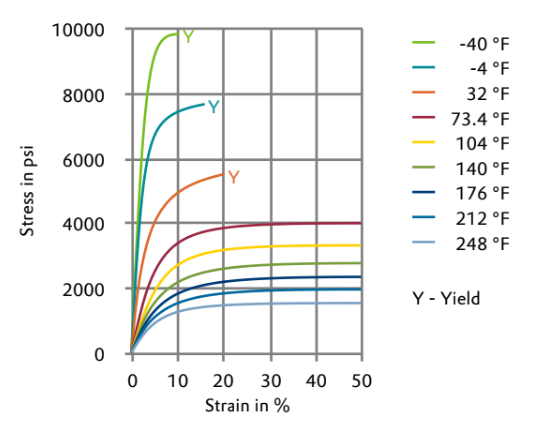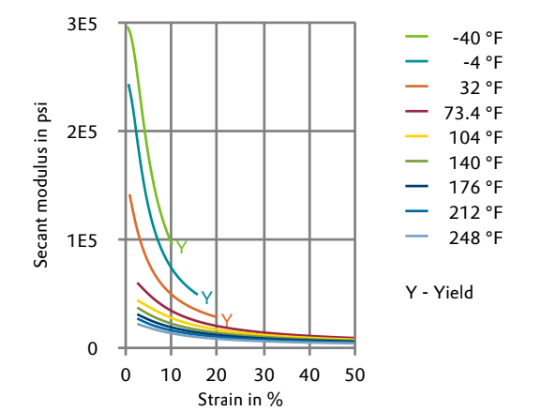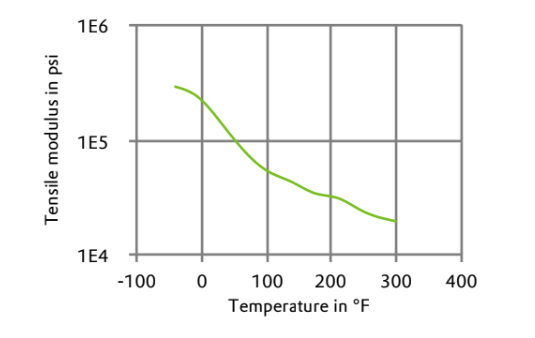Knowde Enhanced TDS
Identification & Functionality
- Additives Included
- Chemical Family
- Polymer Name
- Plastics & Elastomers Functions
- Technologies
- Product Families
Features & Benefits
- Materials Features
- Product Attributes
Parts made of VESTAMID® X7393 BK 9.7507 are characterized by optimized cold temperature impact resistance for the extrusion of semi-rigid tubing with increased burst pressure resistance as well as exceptional low coefficient of friction and good chemical resistance. Properties of compounds based on Polyamide 12 vary little with changing humidity due to their low moisture absorption.
Applications & Uses
- Applications
- Plastics & Elastomers End Uses
- Plastics & Elastomers Processing Methods
Properties
- Flame Rating
- Mechanical Properties
- Physical Properties
- Thermal Properties
- Electrical Properties
- Rheological Calculation Properties
- Test Specimen Production
- Rheological Properties
- Burn Testing Properties
| Value | Units | Test Method / Conditions | |
| Tensile Modulus (dry) | 81200 | psi | ISO 527 |
| Tensile Modulus (cond.) | 71800 | psi | ISO 527 |
| Tensile Strength (dry) | 4500 | psi | ISO 527 |
| Tensile Strength (cond.) | 4060 | psi | ISO 527 |
| Yield Stress (dry) | 4500 | psi | ISO 527 |
| Yield Stress (cond.) | 4060 | psi | ISO 527 |
| Yield Strain (dry) | 26 | % | ISO 527 |
| Yield Strain (cond.) | 26 | % | ISO 527 |
| Stress at 50% Strain (dry) | 4350 | psi | ISO 527 |
| Stress at 50% Strain (cond.) | 3920 | psi | ISO 527 |
| Stress at Break (dry) | 6380 | psi | ISO 527 |
| Stress at Break (cond.) | 6090 | psi | ISO 527 |
| Nominal Strain at Break (ɛtb, dry) | min. 50 | % | ISO 527 |
| Nominal Strain at Break (ɛtb, cond.) | 200 | % | ISO 527 |
| Charpy Notched Impact Strength (+23°C, dry) | 54.7 | ftlb/in² | ISO 179/1eA |
| Charpy Notched Impact Strength (+23°C, cond.) | 59 | ftlb/in² | ISO 179/1eA |
| Charpy Notched Impact Strength (-30°C, dry) | 3.81 | ftlb/in² | ISO 179/1eA |
| Charpy Notched Impact Strength (-30°C, cond.) | 3.81 | ftlb/in² | ISO 179/1eA |
| Flexural Modulus (23°C, dry) | 104000 | psi | ISO 178 |
| Flexural Modulus (23°C, cond.) | 69600 | psi | ISO 178 |
| Flexural Stress at Conv. Deflection (23°C, cond.) | 2320 | psi | ISO 178 |
| Flexural Strength (23°C, dry) | 4640 | psi | ISO 178 |
| Flexural Strength (23°C, cond.) | 3630 | psi | ISO 178 |
| Flexural Strain at Flexural Strength (23°C, cond.) | 9 | % | ISO 178 |
| Value | Units | Test Method / Conditions | |
| Density (dry) | 1.02 | g/cm³ | ISO 1183 |
| Water Absorption (dry) | 12 | % | Sim. to ISO 62 |
| Humidity Absorption (dry) | 0.6 | % | Sim. to ISO 62 |
| Value | Units | Test Method / Conditions | |
| Melting Temperature (dry) | 343 | °F | ISO 11357-1/-3 |
| Glass Transition Temperature (dry) | 75.2 | °F | ISO 11357-1/-2 |
| Temperature of Deflection Under Load A (1.80 Mpa, dry) | 13 | °F | ISO 75-1/-2 |
| Temperature of Deflection Under Load B (0.45 Mpa, dry) | 239 | °F | ISO 75-1/-2 |
| Vicat Softening Temperature A (10 N, 50 K/h, dry) | 338 | °F | ISO 306 |
| Vicat Softening Temperature B (50 N, 50 K/h, dry) | 266 | °F | ISO 306 |
| Coefficient of Linear Thermal Expansion (23°C to 55 °C, Parallel, dry) | 7.78e-05 | in/in/°F | ISO 11359-1/-2 |
| Coefficient of Linear Thermal Expansion (23°C to 55 °C, Normal, dry) | 7.78e-05 | in/in/°F | ISO 11359-1/-2 |
| Value | Units | Test Method / Conditions | |
| Volume Resistivity (pV, dry) | 1E10 | Ohm*m | IEC 62631-3-1 |
| Relative Permittivity (100Hz, dry) | 7 | — | IEC 62631-2-1 |
| Relative Permittivity (1MHz, dry) | 4.2 | — | IEC 62631-2-1 |
| Dissipation Factor (100Hz, dry) | 1900 | E-4 | IEC 62631-2-1 |
| Dissipation Factor (1Mhz, dry) | 1100 | E-4 | IEC 62631-2-1 |
| Electric Strength (AC, S20/P50, dry) | 686 | V/mil | Sim. to IEC 60243-1 |
| Comparative Tracking Index (Test Solution A, 50 Drops Value, dry) | 600 | — | IEC 60112 |
| Value | Units | Test Method / Conditions | |
| Minimum Mold Temperature | 86 | °F | — |
| Maximum Mold Temperature | 212 | °F | — |
| Minimum Melt Temperature | 392 | °F | — |
| Maximum Melt Temperature | 464 | °F | — |
| Value | Units | Test Method / Conditions | |
| Injection Molding - Melt Temperature | 428 | °F | ISO 294 |
| Injection Molding - Mold Temperature | 140 | °F | ISO 294 |
| Injection Molding - Injection Velocity | 7.87 | in/s | ISO 294 |
| Injection Molding - Pressure at Hold | 10200 | psi | ISO 294 |
| Value | Units | Test Method / Conditions | |
| Melt Volume Flow Rate (dry, at 464°F, 11lb) | 8 | cm³/10min | ISO 1133 |
| Molding Shrinkage (Parallel, dry) | 0.8 | % | ISO 294-4, 2577 |
| Molding Shrinkage (Normal, dry) | 1.4 | % | ISO 294-4, 2577 |
| Mold Temperature (dry) | 140 | °F | — |
| Melt Temperature (dry) | 464 | °F | — |
| Value | Units | Test Method / Conditions | |
| Burning Behavior (at 1.5 mm Nominal Thickness) (dry) | HB | class | IEC 60695-11-10 |
| Burning Behavior (at Thickness 0.1260 in.) (dry) | HB | class | IEC 60695-11-10 |
Regulatory & Compliance
- Quality Standards
Technical Details & Test Data
- Stress - Strain (Dry)

- Secant Modulus - Strain (Dry)

- Tensile Modulus - Temperature (Dry)

Packaging & Availability
- Packaging Information
VESTAMID® X7393 BK 9.7507 is supplied as pellets, ready for use, in moisture-proof bags.
Storage & Handling
- Shelf Life
- 2 years
- Storage Conditions
Inside the original and undamaged packaging, the product has a shelf life of at least 2 years when stored in dry rooms at temperatures not exceeding 30°C.

